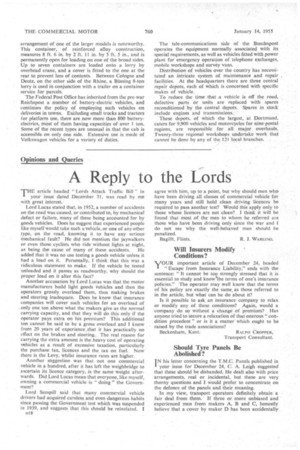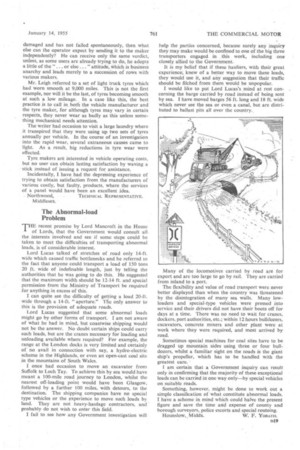Opinions and Queries
Page 58

Page 59

If you've noticed an error in this article please click here to report it so we can fix it.
A Reply to the Lords
THE article headed "Lords Attack Traffic Bill" in your issue dated December 31, was read by me with great interest: ' Lord Lucas stated that, in 1952, a number of accidents on the road was caused, or contributed to, by mechanical defect or failure, many of these being accounted for by goods vehicles. Does he suggest that experienced people like myself would take such a vehicle, or one of any other type, cm the road, knowing it to have any serious mechanical fault? He did not mention the jaywalkers or even those cyclists who ride without lights at night, as being the cause of many of these accidents. He added that it was no use testing a goods vehicle unless it had a load on it. Personally, I think that this was a ridiculous statement to make. If the vehicle be tested unloaded and it passes as roadworthy, why should the proper load on it alter this fact?
Another accusation by Lord Lucas was that the motor manufacturers build light goods vehicles and then the operators grossly overload them, thus making brakes and steering inadequate. Does he know that insurance companies will cover such vehicles for an overload of only one ton above what the makers give as the normal carrying capacity, and that they will do this only if the operator pays extra on his premium? This additional ton cannot be said to be a gross overload and I know from 20 years of experience that it has practically no effect on the brakes and steering. The real reason for carrying the extra amount is the heavy cost of operating vehicles as a result of excessive taxation, particularly the purchase tax, licences and the tax on fuel. Now there is the Levy, whilst insurance rates are higher.
Another suggestion was that not one commercial vehicle in a hundred, after it has left the weighbridge to ascertain its licence category, is the same weight afterwards_ Did Lord Lucas mean that everyone, like myself, owning a commercial vehicle is " doing" the Government?
Lord Sempill said that many commercial vehicle drivers had acquired careless and even dangerous habits since passing the Government test which was suspended in 1939, and suggests that this should be reinstated. I o I 8 agree with him, up to a point, but why should men who have been driving all classes of commercial vehicle for many years and still hold clean driving licences be required to pass another test? Would this apply only to those whose licences are not clean? I think it will be found that most of the men to whom he referred are those who have been driving only since the war and f do not see why the well-behaved men should be penalized.
Bagil It, Flints. R. J. WAREING.
Will Insurers Modify Conditions?
VOUR important article of December 24, headed
"Escape from Insurance Liability," ends with the sentence: "It cannot be too strongly stressed that it is essential to study and knowlithe terms of one's insurance policies," The operator may well know that the terms of his policy are exactly the same, as those referred to in the article, but what can he do about it?
Is it possible to ask, an insurance company to relaxor modify any of thes,e conditions? Again, would a company do so without a change of premium? Has anyone tried to secure a relaxation of that onerous " condition precedent" or is it a matterwhich ought to be raised by the trade associations?
Beckenham, Kent, RALPH CROPPER, Transport Consultant.
Should Tyre Panels Be Abolished?
IN his letter concerning the T.M.C. Panels published in I your issue for December 24, C. A. Leigh suggested that these should be disbanded. He dealt also with price arrangements, real or incidental, but these are very thorny questions and I would prefer to concentrate on the defence of the panels and their meaning.
In my view, transport operators definitely obtain a fair deal from them. If three or more unbiased and experienced men from makers A, B and C, honestly believe that a cover by maker D has been accidentally damaged and has not failed spontaneously, then what else can the operator expect by sending it to the maker independently? He can receive only the same verdict, unless, as some users are already trying to do, he adopts a little of the " ... or else ... "attitude, which is business anarchy and leads merely to a succession of rows with various makers.
Mr. Leigh referred to a set of light truck tyres which had worn smooth at 9,000 miles. This is not the first example, nor will it be the last, of tyres becoming smooth at such a low mileage. In a case like this, the best practice is to call in both the vehicle manufacturer and the tyre maker, for although tyres may vary in certain respects, they never wear as badly as this unless something mechanical needs attention.
The writer had occasion to visit a large laundry where it transpired that they were using up two sets of tyres annually per vehicle. In the course of an investigation into the rapid wear, several extraneous causes came to light. As a result, big reductions in tyre wear were effected.
Tyre makers are interested in vehicle operating costs, but no user can obtain lasting satisfaction by waving a stick instead of issuing a request for assistance.
Incidentally, I have had the depressing experience of trying to obtain satisfaction from the manufacturers of various costly, but faulty, products, where the services of a panel would have been an excellent idea.
Northwood,, TECHNICAL REPRESENTATIVE. Middlesex.
The Abnormal-load Problem
THE recent promise by Lord Mancroft in the House of Lords, that the Government would consult all. the interests involved and see if some steps could be taken to meet the difficulties of transporting abnormal loads, is of considerable interest.
Lord Lucas talked of stretches of road only 14-ft. wide which caused traffic bottlenecks and he referred to the fact that anyone could transport a load of 150 tons 20 ft. wide of indefinable length, just by telling the authorities that he was going to do this. He suggested that the maximum width should be 12-14 ft. and special permission from the Ministry of Transport be required for anything in excess of this.
I can quite see the difficulty of getting a load 20-ft. wide through a 14-ft. "aperture." T6e only answer to this is the provision of adequate roads.
Lord Lucas suggested that some abnormal loads might go by other forms of transport. I am not aware of what he had in mind, but coastwise shipping would not be the answer. No doubt certain ships could carry such loads, but are the cranes necessary for loading and unloading available where required? For example, the range at the London docks is very limited and certainly of no avail in connection with say, a hydro-electric scheme in the Highlands, or even an open-cast coal site in the mountains of South Wales.
I once had occasion to move an excavator from Suffolk to Loch Tay. To achieve this by sea would have meant a 100-mile road journey to London, whilst the nearest off-loading point would have been Glasgow, followed by a further 100 miles, with detours, to the destination. The shipping companies have no special type vehicles or the experience to move such loads by land. They are not heavy-haulage contractors, and probably do not wish to enter this field.
I fail to see how any Government investigation will help the parties concerned, because surely any inquiry they may make would be confined to one of the big three transporters engaged in this work, including one closely allied to the Government.
It is my belief that if these hauliers, with their great experience; knew of a better way to move these loads, they would use it, and any suggestion that their traffic should be filched from them would be unpopular.
I would like to put Lord Lucas's. mind at rest concerning the barge carried by road instead of being sent by sea. I have moved barges 56 ft. long and 18 ft. wide which never see the sea or even a canal, but are distributed to ballast pits all over the country.
Many of the locomotives carried by road are for export and are too large to go by rail. They are carried from inland to a port.
The flexibility and value of road transport were never better displayed than when the country was threatened by the disintegration of many sea walls. Many lowloaders and special-type vehicles were pressed into service and their drivers did not have their boots off for days at a time. There was no need to wait for cranes, dockers, port authorities, etc.; within 12 hours bulldozers, excavators, concrete mixers and other plant were at work where they were required, and most arrived by road.
Sometimes special machines for coal sites have to be dragged up mountain sides using three or four bulldozers, whilst a familiar sight on the roads is the giant ship's propeller, which has to be handled with the greatest care.
I am certain that a Government inquiry, can result only in confirming that the majority of these exceptional loads can be carried in one way only—by special vehicles on suitable roads.
Something, however, might be done to work out a simple classification of what constitute abnormal loads. I have a scheme in mind which could halve the present figure and save the time and expense of county and borough surveyors, police escorts and special routeing.
Hounslow. M iddx. W. F. YORATH.
















































































































